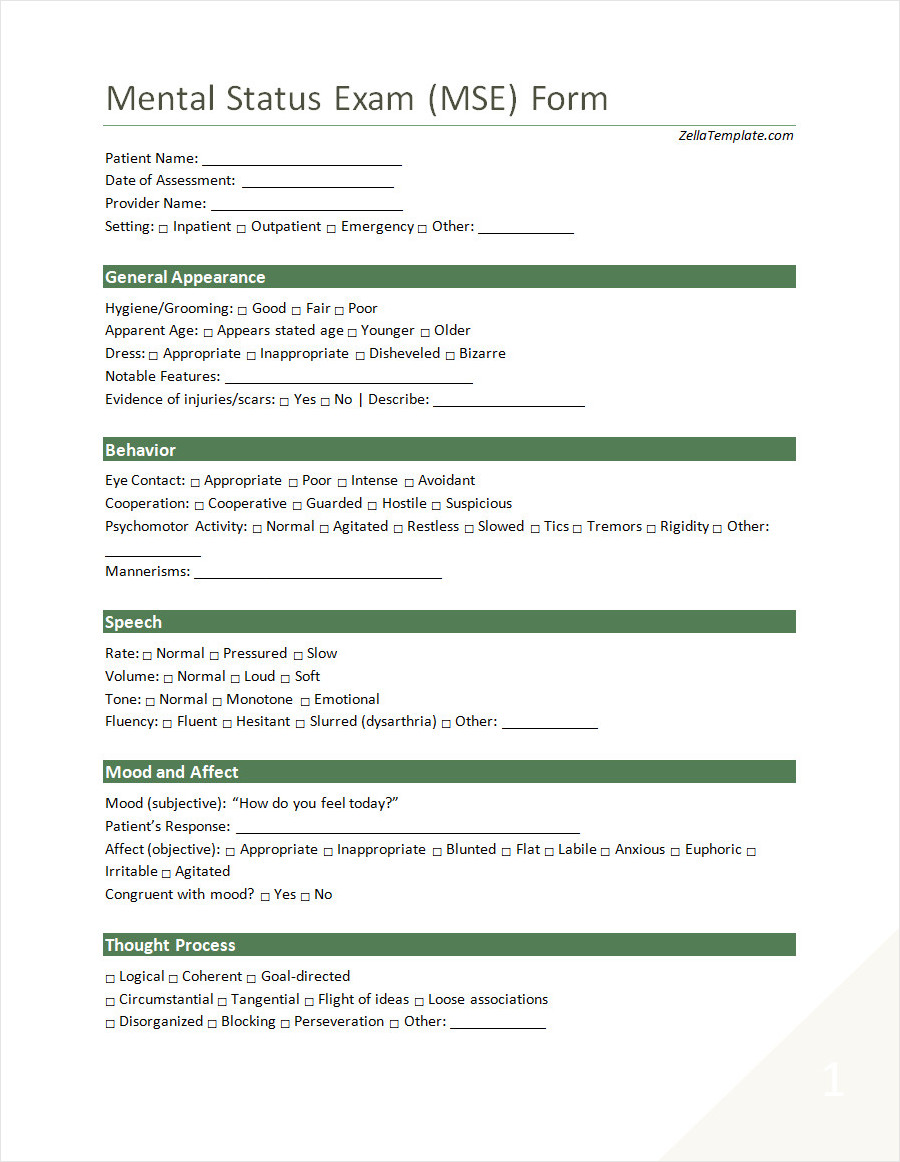Mental health is a complex and multifaceted aspect of overall well-being that plays a crucial role in our daily functioning. Assessing an individual’s mental state is essential in identifying any potential concerns or impairments that may impact their quality of life. One of the tools used by healthcare professionals to systematically assess a person’s current mental state is the Mental Status Exam (MSE).
Table of Contents
What Is A Mental Status Exam?
A Mental Status Exam (MSE) helps healthcare providers assess an individual’s mental functioning. It gives insight into a person’s cognitive abilities, emotional state and behavior, and supporting a broader understanding of their overall mental health.
Providers conduct the MSE using questions and observations that evaluate various aspects of the person’s mental state. The information collected helps clinicians diagnose conditions, create treatment plans, and track changes in the patient’s mental health over time.
Why Healthcare Providers Perform a Mental Status Exam?
Healthcare providers perform a Mental Status Exam to gain a comprehensive understanding of a person’s mental health status. The MSE helps clinicians identify potential areas of concern or impairment that may require further evaluation or treatment.
By conducting a thorough assessment of the individual’s mental state, healthcare professionals can make accurate diagnoses, develop tailored treatment plans, and monitor the effectiveness of interventions over time.
The information obtained from the MSE is crucial in managing various mental health conditions and neurological disorders that can affect a person’s mental processes.
Components of a Mental Status Exam
During a Mental Status Exam, healthcare providers evaluate various aspects of a person’s mental state. Some key components of the MSE include:
- Appearance and behavior: Observations of the individual’s physical appearance, grooming, and overall behavior.
- Mood and affect: Assessment of the person’s emotional state, including their mood, affect, and overall demeanor.
- Thought process and content: Examination of the individual’s thought patterns, coherence, and content of their thoughts.
- Perceptual disturbances: Evaluation of any hallucinations or delusions that the person may be experiencing.
- Cognitive functioning: Assessment of the individual’s memory, attention, language, and other cognitive abilities.
- Insight and judgment: Determining the person’s awareness of their mental health condition and ability to make sound decisions.

When Do Healthcare Providers Perform A Mental Status Exam?
Healthcare providers may perform a Mental Status Exam in a variety of settings, including hospitals, clinics, and private practices. The MSE is typically conducted as part of a comprehensive psychiatric evaluation or when a person presents with symptoms that suggest a mental health concern.
Some common reasons for performing a Mental Status Exam include:
- Assessing new psychiatric patients: When a person seeks help for mental health issues for the first time, a Mental Status Exam may be conducted to assess their current mental state.
- Monitoring treatment progress: Healthcare providers may use the MSE to track changes in a patient’s mental health status over time and evaluate the effectiveness of treatment interventions.
- Addressing acute mental health concerns: In emergencies or when a person exhibits acute mental health symptoms, a Mental Status Exam may be performed to assess their immediate needs and risks.
- Evaluating cognitive decline: The MSE is also used to evaluate cognitive functioning in older adults or individuals with neurological conditions that may impact their mental processes.
How To Examine Mental Status?
Conducting a Mental Status Exam requires a systematic approach and attention to detail. Healthcare providers follow a structured process to assess different aspects of a person’s mental state.
Some key steps involved in examining mental status include:
- Establish rapport: Building trust and rapport with the individual is essential to create a comfortable environment for the assessment.
- Gather information: Obtain a thorough history of the person’s mental health symptoms, medical history, and current concerns.
- Conduct observations: Observe the individual’s appearance, behavior, and interactions during the assessment.
- Ask relevant questions: Use a combination of open-ended and specific questions to assess the person’s cognitive abilities, emotional state, and thought processes.
- Document findings: Record detailed notes of the observations, responses, and impressions gathered during the MSE for accurate documentation and treatment planning.
Mental Health Status Exam Form Template
A Mental Health Status Exam (MSE) form is an essential tool for mental health professionals to assess, document, and monitor a client’s psychological functioning. It provides a structured format for evaluating key areas, such as appearance, mood, thought processes, cognition, and behavior, which helps guide accurate diagnosis and treatment planning.
Use our free Mental Health Status Exam Form today to support clear, consistent, and professional mental health documentation. Ideal for therapists, counselors, psychologists, and clinical settings—easy to use, printable, and fully customizable.
Mental Status Exam Template – Word